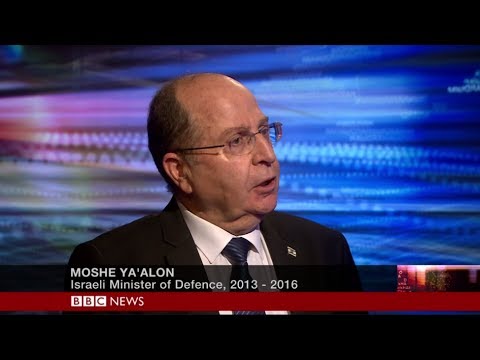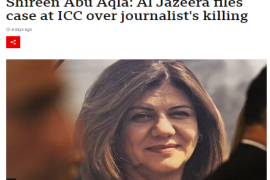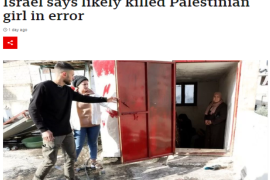On the same day that Moshe Ya’alon resigned from the post of Minister of Defence in May 2016, the BBC World Service aired a radio programme with the extraordinary title “Has Israel Lost its ‘Moral Compass’?”
That BBC fixation on the ‘moral health’ of Israeli society was again in evidence when, on June 28th, Ya’alon gave an interview to the BBC World News channel programme ‘Hardtalk‘.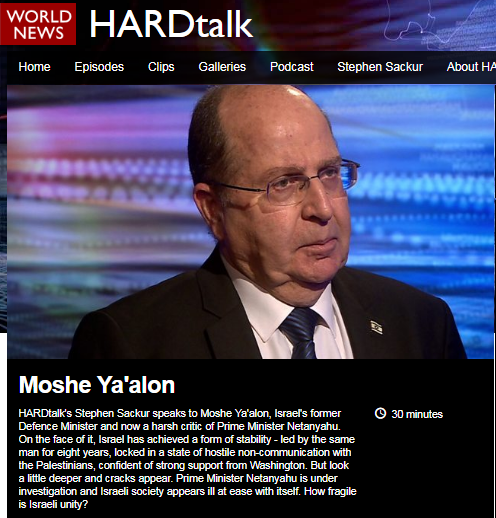
The interview is available in the UK on iPlayer here or alternatively here. An audio version that was broadcast on BBC World Service radio on June 30th with the following synopsis is available here.
“Moshe Ya’alon served in the Israel Defence Force for 38 years including as Chief of Staff from 2002 to 2005. He then entered politics and served as Minister of Defence for three years until his resignation in May 2016. At the time warned that Israel had been taken over by “dangerous and extreme elements.” He wants to run for prime minister at Israel’s next election and he tells HARDtalk’s Stephen Sackur “I found too many politicians generating hatred against someone, against the Arabs, against leftists, against the media, against the Supreme Court, which is a challenge”.”
That same theme was also amplified in a clip from the interview that was promoted separately on social media and on the BBC News website.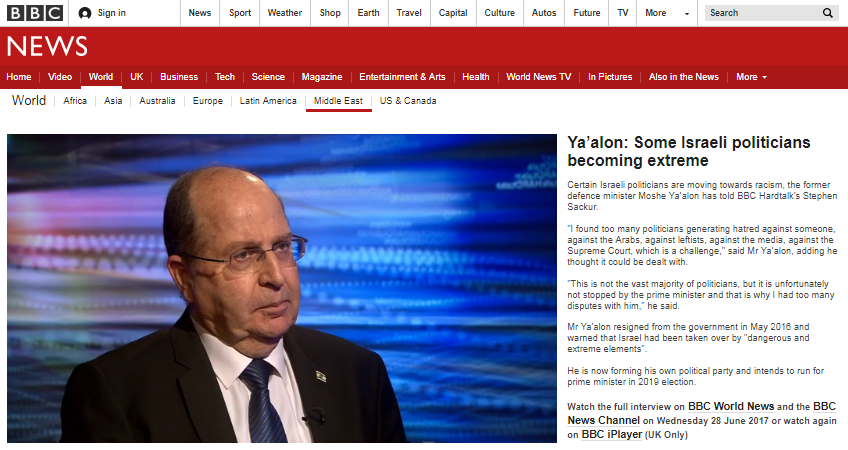
“Certain Israeli politicians are moving towards racism, the former defence minister Moshe Ya’alon has told BBC Hardtalk’s Stephen Sackur.
“I found too many politicians generating hatred against someone, against the Arabs, against leftists, against the media, against the Supreme Court, which is a challenge,” said Mr Ya’alon, adding he thought it could be dealt with.
“This is not the vast majority of politicians, but it is unfortunately not stopped by the prime minister and that is why I had too many disputes with him,” he said.
Mr Ya’alon resigned from the government in May 2016 and warned that Israel had been taken over by “dangerous and extreme elements”.”
The focus on that theme will of course be unsurprising to anyone familiar with the BBC’s long-standing and recurrent portrayal of Israel as ‘shifting to the right’. Host Stephen Sackur made sure that the first part of the interview was similarly devoted to the topic of Israel’s ‘moral health’ using a succession of statements-cum-questions.
“Israel has just marked and celebrated 50 years since the victory in the Six Day War but you seem to feel right now there are some very serious questions about the direction Israel is going in and about national cohesion. Why are you so worried?”
After Ya’alon had spoken about a “relatively calm” security situation, Sackur asked:
“So it’s not an existential security threat that you feel is most concerning to Israel today?”
Ya’alon then pointed out that Israel’s vibrant democracy includes independent law enforcement authorities, expressing confidence in the ongoing investigation into allegations of corruption concerning Netanyahu. Sackur continued:
“But it’s not just about Netanyahu is it? I mean you said this not long ago; it caused a real stir in Israel. You said ‘to my great sorrow extremist and dangerous elements have taken over Israel and in particular the Likud party and are shaking the foundations of the country and threatening to hurt its residents. Those are very powerful words.”
“Extremism, you said, extremism in your own government that you loyally served for 7 years.”
After Ya’alon had pointed out that Israel’s “vibrant society” means that he is able to criticize the government, Sackur pressed him further:
“You also have a responsibility to be clear about what you mean so I want you to tell me exactly what you mean by this extremism you see from inside the Israeli government.”
Although Ya’alon expressed confidence that “we are able to deal with it” in relation to what he described as “too many politicians generating hatred against someone”, Sackur was not done.
“Isaac Herzog – formerly of the Labour party, now the Zionist Union – he coined this extraordinary word. He called it the ‘fascistisation’ of Israel under Netanyahu. Sounds like you’re almost agreeing with him.”
“You would use that phrase – fascistisation – would you?”
Ya’alon clarified that “it is not the vast majority of politicians” stating that “it is unfortunately not stopped by the prime minister and that’s why I had too many disputes with him”, to which Sackur responded:
“I am very puzzled as to how you could sit in cabinet as, I think, deputy premier for 3 or 4 years and then as defence secretary – the senior security post in the cabinet for –what – more than three years serving as a loyal ally of Binyamin Netanyahu and then you fall out with him after 7 years of service and come out saying that he’s fostering extremism and possibly fascistisation of Israel. It seems extraordinary.”
In response to Ya’alon’s statement that the issues arose around the time of the 2015 election Sackur interjected:
“What; he [Netanyahu] suddenly changed, did he?”
A significant proportion of the interview was also devoted to discussion of allegations concerning a third party not afforded the right of reply, despite that condition being stipulated in BBC editorial guidelines.
“We’ll get to the bigger strategic picture in a moment but let’s just stick to the internal politics of Netanyahu, the Likud party and the right-wing in Israel because you have become a critic now but you’ve been intimately involved for an awful long time. How can you say that you have absolutely no doubt that Binyamin Netanyahu is guilty of these allegations – all of which he absolutely adamantly denies – some of which concern his personal behaviour, some of which concern the behaviour of others – to do with a defence contract particularly involving submarines which Netanyahu himself isn’t involved with but people close to him are. You say you have no doubt that…if he is not indicted, you say, I will go on a speaking tour and tell all. What is it you know that the rest of Israel doesn’t?”
“People don’t change their spots, do they? I mean you say Netanyahu somehow flipped in 2015 around the time of the election. You’d served him by then for – what – six years. You can’t tell me that the man you knew for six years became somebody completely different after that election.”
Relating to the allegations of corruption against Netanyahu, Sackur quipped:
“Well of course he denies it.”
After Ya’alon had once again expressed confidence in the ability of the Israeli law enforcement authorities to “deal with it properly”, Sackur commented:
“Netanyahu dismisses everything you say about him with a smile and says that you are just desperate to try to launch your own political career; frankly a political career which looks right now like it’s really struggling.”
Sackur then returned to the topic of Israel’s ‘moral health’, dabbling in pseudo-psychological analysis of “the Israeli psyche”.
“Is…ahm…is this not just about Netanyahu? Do you think this is about something corrosive at the heart of the Israeli state which says something about Israeli values today?”
“It’s not just about money and corruption in politics though, is it? It’s about values connected to the very biggest of pictures. For example Israel’s continued occupation after 50 years of the West Bank and what that does to the Israeli psyche and to young Israelis in particular.”
Sackur continued with a selective presentation of Rabin’s approach to the peace process of the type that is commonly found in BBC content.
“You’re the same Moshe Ya’alon who supported Rabin, supported the two-state process, supported Oslo.”
Opting not to enhance audience understanding of the topic of the peace process by exploring further Ya’alon’s statement that his views on Oslo changed when he was “exposed to the details when I became the head of the intelligence”, Sackur insisted:
“Rabin continued to believe. Rabin – and I lived in Israel in Israel at the time and I remember it very well – Rabin repeatedly said Israel has no choice: we simply have to make peace with our enemies. There is no alternative.”
“He[Rabin] never gave up on the two-state solution.”
After Ya’alon reminded him for a second time of Rabin’s final speech in the Knesset, Sackur slightly changed his tack.
“My point is not just about the two-state solution. It’s about the idea of no alternative. Just the other day Ehud Barak – another chief of staff of the Israeli defence forces, another former prime minister – said that this government – he’s talking about the Netanyahu government – is putting the country on the path to becoming an apartheid state and it should be brought down if it fails to change course.”
Ya’alon then listed the repeated Palestinian rejections of peace offers and partition, to which Sackur responded:
“But as Israelis do you not have a duty to keep searching, to keep working for a solution? Because if not, your own people will suffer the consequences.”
After Ya’alon had noted that the Palestinians have their own parliament, government and president, audiences got some noteworthy insight into the kind of politicised sources used by Sackur as the basis for his ‘questions’ and statements.
“But, forgive me, you do rule them [the Palestinians] and I just…look, because I knew I was going to talk to you today I did a little bit of research about your post as defence minister and what happened. A series of reports crossed your desk from UNICEF in 2013 saying the ill-treatment of children who came into contact with the military detention system in the West Bank appears to be widespread, systematic and institutionalised. Human Rights Watch; a very detailed report how Israeli security forces use unnecessary force to arrest and detain Palestinian children as young as eleven, choking them, throwing stun grenades at them, beating them in custody. These are reports that crossed your desk as defence minister: the work of your IDF. This is what the occupation means.”
Former IDF Chief West Bank Prosecutor Lt.-Col. (res.) Maurice Hirsch addressed that UNICEF report quoted by Sackur in an interview given to the Jerusalem Post earlier this year.
“Hirsch said that UNICEF’s March 2013 report, which made headlines in countries and government offices on multiple continents, had an “almost zero” connection to reality in terms of the law or the applicable facts. […]
“Having started a dialogue with UNICEF, it soon became clear that we weren’t necessarily dealing with another UN organization that was just Israel-bashing… I realized that much of the report was basically plagiarized from a previous report by DCI [Defense for Children International] Palestine,” and that “the actual authors themselves didn’t necessarily understand what had been written… or have the factual background to understand the reality,” commented Hirsch. […]
“The unfortunate side of the discussions was that even though I had unequivocally shown the UNICEF members that what they had written was factually and legally flawed, they remained stubborn in their refusal to put out a clear statement that the initial report was simply erroneous.””
Sadly for the BBC’s reputation for accuracy and impartiality, Stephen Sackur’s “little bit of research” obviously did not include familiarising himself with the full background to that UNICEF report and he is clearly unperturbed by the records of political campaigning groups such as DCI Palestine and Human Rights Watch (frequently quoted and promoted in BBC content).
Sackur then came up with the grossly inaccurate claim that led Ya’alon to charge him with “rewriting the history”.
“Your government – that is the Netanyahu government which you loyally served until 2016 – decided not to negotiate with the Palestinians.”
After Ya’alon had clarified that the Palestinians were the party that in fact refused to continue the nine months of negotiations that took place in 2013/14, Sackur tried to sidestep his inaccuracy by invoking yet another political NGO popular with the BBC – ‘Breaking the Silence‘.
“With respect, minister; you’re playing this tit for tat game of who was responsible for the breakdown of talks. I’m trying to dig to something deeper about the morals, the values, the cohesion of an Israeli society that has always prided itself on having the very best of humane values. And I’m putting it to you, if you listen to Israeli soldiers who have served the occupation like Yehuda Shaul of ‘Breaking the Silence’ – a group that is now opposed to the occupation of former IDF soldiers – he says this is the moral consequence of prolonged occupation of the Palestinian people; that is, the corruption of young Israelis who serve that occupation.”
The interview then took an even more bizarre turn which will be discussed in part two of this post.
Related Articles:

